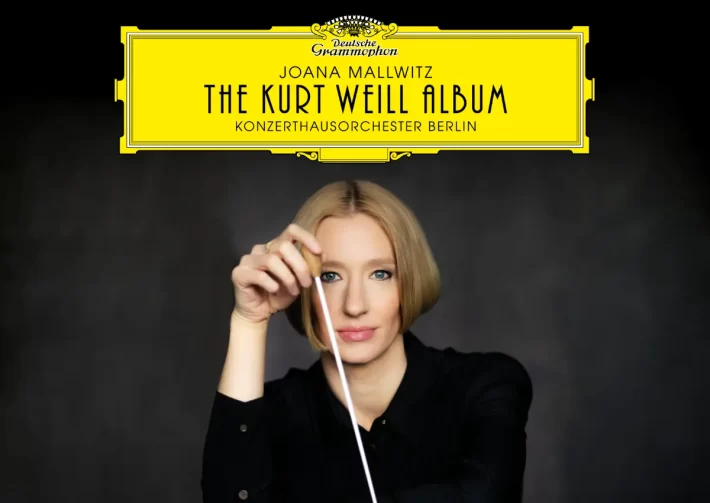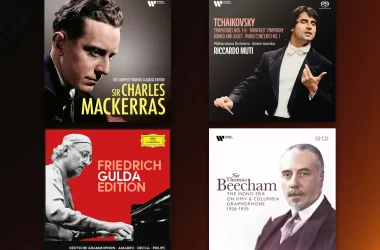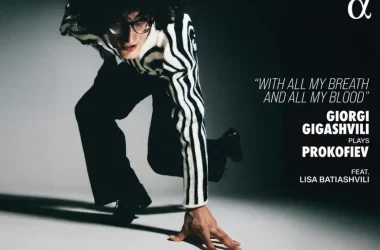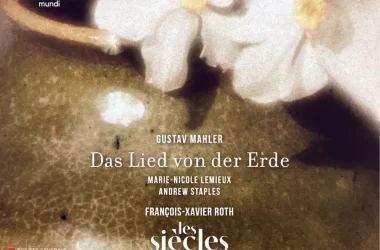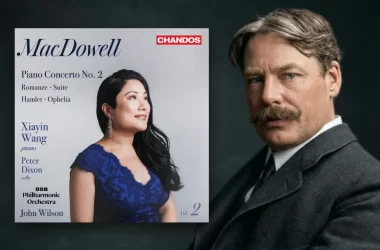Recordings of Weill’s two symphonies are not plentiful: Apple Music Classical lists four recordings of the first and nine more of the second, all released in the last few years: Swedish Chamber Orchestra and H.K. Gruber (2023/BIS); Ulster Orchestra and van Steen (Somm); and Rotterdam Philharmonic Orchestra under (Warner Classics, both 2022). I greatly enjoyed Gruber’s invigorating and nuanced readings, captured in typically excellent BIS SACD sound. And now DG offers this newcomer, which includes not only both symphonies but an intensely enthralling “The Seven Deadly Sins.”
This is Joana Mallwitz’s first recording for DG and it is a resounding success. The Berlin Konzerthausorchester is uniformly exceptional in all departments. Symphony No. 1 is thorny, densely contrapuntal music, but these forces have its full measure. More impressive is how the playing inhabits every stylistic idea Weill stuffed into the score: gently Romantic moments (admittedly rare), answered by white-heat Expressionism, followed by stern Neo-Classical passages. Each has suitable coloration, weight, and emotional effect. Careful voicing of dissonant chords and ensuring polyphonic clarity keeps Weill’s opaque counterpoint from becoming wearisome.
Mallwitz also allows more time to get through the symphony (24 minutes, whereas Gruber is about five minutes faster). Both Gruber and Anthony Beaumont (Chandos) use chamber orchestras, which heightens the austere elements of the score. Mallitz’s larger string section highlights the music’s late Romantic antecedents. Admittedly, Beaumont and Gruber help me appreciate and respect the symphony, but Mallitz and her Berlin orchestra help me like it.
The chemistry between conductor and players is a key ingredient to the success of this album, resulting in playing of tremendous character and energy. That is particularly apparent in their “Seven Deadly Sins” accompaniment. This ballet chanté (sung ballet) was composed in the 1920s Berlin to a set by Bertolt Brecht, damning, among other things, industrial capitalism. The text (and its musical setting) is direct and scathing, qualities very much realized in this reading. Katharine Mehrling’s Anna is wonderful – sample the resigned weariness she brings to Envy (track 12). And the male quartet are just as good. Mehrling is more engaging than von Otter (Gardiner/DG), and this new reading is far more idiomatic than Rattle’s 1982 Birmingham performance on Warner Classics.
The second symphony is more “user-friendly” if you will, Weill’s mature voice fully recognizable in its memorable tunes, clear orchestration, biting sarcasm and darkly humorous atmosphere. Anyone who enjoys Shostakovich’s dark vein of humor will find much to delight in here. The subtitle “Symphonic Fantasy” suggests programmatic music, but this was not what the composer intended: the title was added at the suggestion of Bruno Walter, the work’s first champion, who felt it would generate greater interest in the music.
Join The Classical Newsletter
Get weekly updates from The Classic Review delivered straight to your inbox.
It is difficult not to hear the trumpet’s opening melody as a cabaret ballad. The following Allegro is almost incessantly busy, veering between joy and something more manic – dazzling orchestral playing here. The poignant Largo is the expressive center of the work, a slow military march recalling Mahler and, again, Shostakovich. The closing Allegro Vivace, played with unanimous articulation and tremendous elan, is surely meant as a parody of Nazi goose-stepping. The percussion parts, again added at the suggestion of Walter, certainly add to that impression.
I was greatly impressed, too, by DG ancillary materials, which include excellent notes by Wolfgang Rathert and a fascinating interview between Mallwitz and James Holmes, editor of the symphonies for the critical edition of Kurt Weill’s oeuvre. Frustratingly, DG does not include the libretto (or a link to one) for “The Seven Deadly Sins” – a significant disappointment. Otherwise, a brilliantly played, full program (82 minutes), marking the beginnings of an auspicious partnership. I look forward to hearing their next release.

Recommended Comparisons:
Gruber | De Waart | Alsop | Gardiner
“The Kurt Weill Album”
Katharine Mehrling – Soprano
Konzerthausorchester Berlin
Joana Mallwitz – Conductor

Check offers of this album on Amazon Music.
Album Details |
|
|---|---|
| Album name | The Kurt Weill Album |
| Label | Deutsche Grammophon |
| Catalogue No. | DG 4865670 |
| Amazon Music link | Stream here |
| Apple Music link | Stream here |

